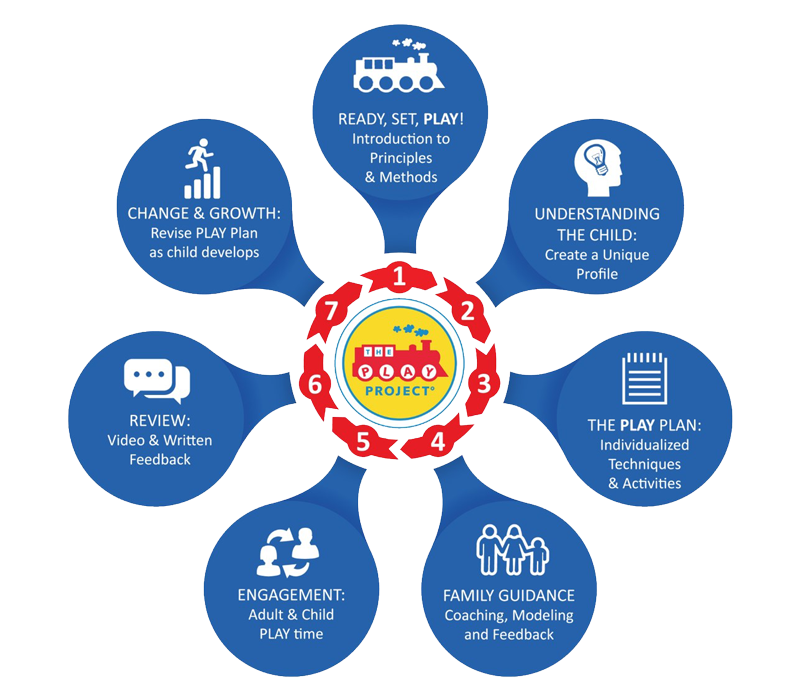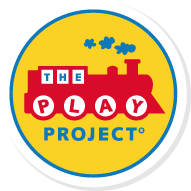Parents
The PLAY Project autism early intervention program empowers parents/caregivers to be their child’s best PLAY partner!
Research shows that young children learn best through play and relationships with others. Play improves the child’s social functioning, an area where children with autism are challenged.
The PLAY Project (PLAY) is a cost effective, evidence-based, autism early intervention program that is parent implemented and play-based. PLAY uses the family’s relationship to intervene and help the child reach their full developmental potential.
Our expert coaches—certified PLAY Project Consultants—help parents/caregivers engage with their often hard-to-engage child in a way that is fun, and promotes the next stages of social-emotional learning. PLAY Project families experience the joy of seeing their child make progress first hand.
Parent Testimonial
“Through The PLAY Project, we learned how to engage Ben in a fun way and by having fun.
He used to ignore us and now he won’t leave us alone! He didn’t talk now he’s using lots of words. Ben made incredible progress!
The PLAY Consultant videotaped our play and gave us really helpful feedback so we knew what techniques to use and what activities to do with Ben.
The PLAY Project changed our life!”
—Lisa and Steve G.
PLAY meets the criteria for ‘intensity’—providing 10-15 hours of intervention per week— because once families learn the principles, methods, techniques, and activities of the PLAY Project they can make every interaction throughout the day a good interaction.
Engaging with your child literally causes the brain to make stronger and better connections as the child begins to form a more complex picture of the world. It all depends on engagement.
To read a great article on how The PLAY Project works check out the Detroit Jewish News.
To read about activities that parents can do with their child check out the PLAY Project Parent Guide.
The brain cells (called ‘neurons’) of children with ASD are disorganized, under-connected, or both. The cause of this brain disorganization is due primarily to genetics—there are dozens to hundreds of ‘autism genes’—though there are some environmental factors that can contribute to autism’s development. Parents do not cause their child’s autism!
The children’s neurons are like a net that can’t capture the complexity of the world. This is what leads to the dominating repetitive interests and behaviors that keep the world the same. This is also what causes children to disconnect socially which can be so heartbreaking for parents.
Luckily, the brains of most children with autism have a developmental capacity to make more and better brain connections if they get intensive intervention. This capacity is called ‘neuronal plasticity’ and it’s the saving grace of autism.
PLAY Project Consultants, who are masters level trained child development specialists, partner with families to build trust, promote family confidence and competence, and strengthen family-child relationships through playful engagement.
The consultant visits the family home one time per month for a 2-3 hour visit*.
During visits, PLAY Consultants help the families learn The 7 Circles of The PLAY Project:
*Note: Some PLAY Programs provide services 1 hour per week in the home or office/clinic setting.
Top 10 Benefits of the PLAY
PLAY offers the earliest possible intervention
PLAY offers the earliest possible intervention and can be used with children as young as a year old who have early signs for ASD.

PLAY empowers parents
PLAY empowers parents/caregivers and gives them the knowledge and skills to be their child’s best play partner.
PLAY is easy to implement
PLAY is easy to implement in the home setting. We teach parents to make every interaction a good interaction.
PLAY is intensive
PLAY is intensive, providing dozens of hours of engaging intervention throughout the week.
PLAY improves interaction and social skills
PLAY improves interaction and social skills, which are the core deficits of autism according to the DSM V, the official psychiatric diagnostic manual.
PLAY helps children with ASD want to be with people.
Fun with people’ is our first principle. Watch out! Your child might not leave you alone!
PLAY helps build happier, more connected relationships
PLAY helps build happier, more connected relationships between the child, siblings, and the whole family.
PLAY is evidence based.
The peer reviewed published research shows that children whose parents put in the time of engagement and interaction improve in their autism symptoms and make substantial gains in the social interaction and functional development
PLAY is an essential ingredient of a complete program
PLAY is an essential ingredient of a complete program and complements other therapist delivered services including speech/language, occupational therapy, pre-school, and ABA.
PLAY can change public policy.
PLAY can change public policy. Ohio has adopted PLAY statewide and helped thousands of children. Click here to view the report.
Frequently Asked Questions
In 2001, the National Research Council—which gathered together a group of experts on autism—reviewed the scientific literature and recommended that young children with autism receive intensive intervention characterized by the following 5 points:
1. Start early. Children with autism can often be diagnosed as early as 14 months!
2. Provide 10-25 hours per week, depending on the severity of the ASD.
3. Intervention should have a 1:1 or 1:2 adult to child ratio for services i.e. one adult works individually with one or two children, usually one on one to start.
4. The intervention must be socially engaging.
5. Intervention should also be strategic, comprehensive, and evidence-based. Intervention must use strategies that are structured, address the comprehensive needs of children with ASD (namely, social, educational, language, behavioral, and physical/sensory needs) and should be based on solid research evidence.
PLAY is an intensive intervention program because it asks parents to engage their child for 2-3 hours per day through a combination of 15-20 minutes PLAY sessions a few times per day and throughout all daily activities.
PLAY can be a primary (stand-alone) intervention for children with ASD under 2 ½ years of age but—to be comprehensive—PLAY can and should be combined with other interventions like speech/language, occupational therapy, pre-school services, and behavioral therapies as determined by the child’s intervention team.
The research evidence for Parent Implemented Models (PIM) is growing and is strong with over a dozen recent rigorous studies (see link) that show that parents can learn to be engaging with their young child with ASD and that children who participate in PIM make interactional and social gains. The PLAY Project’s research is one of the, if not the, most rigorous study done using the PIM approach in the U.S.
Click here to see a list of recent scientific articles.
The evidence shows that parents can learn to be engaging with their young child with ASD and that children who participate in PIM make interactional and social gains.
For a description of The PLAY Project’s rigorous scientific research click here.
Parent Implemented Models (PIM) train parents to help their child.
Other models like behaviorist interventions (see below), schools, speech/language and occupational therapy use therapists to deliver intervention.
The great advantage of PIM is that parents spend the most time with their children and can give more intensive intervention. Even a single parent or two working parent family spends 40+ hours waking time per week with their child!
PIM focus on empowering parents to be their child’s best helper. This gives the parents a deep satisfaction and confidence that they know how to help their own child. When parents learn to successfully engage their hard to engage child with autism it is a joyous experience.
Check out our PLAY Project finder. Click Here
For parents who want to get a more in depth understanding of The 7 Circles of The PLAY Project’s treatment approach, we recommend two sources:
- The online Welcome to The PLAY Project page
- For more information about Dr. Rick’s book Autism: The Potential Within and other resources visit the Family Resources page
- Our Contact Information:
3031 Miller Road | Ann Arbor, Michigan 48103
Phone: 734-585-5333 | Email: info@playproject.org
The PLAY Project (PLAY) is a developmental relationship based (DRB) approach derived from the developmental theories and models including especially the work of Stanley Greenspan MD and Serena Weider PhD. In DRB there is an emphasis on relationships, fun, and child directed engagement that leads to improvement in the child’s emotional and social development. ABA is a behaviorist approach based on operant conditioning models derived from the work of B.F. Skinner PhD and Ivar Lovaas PhD.
For more information on ABA models of early intervention for children with ASD see the Autism Speaks website Click Here
